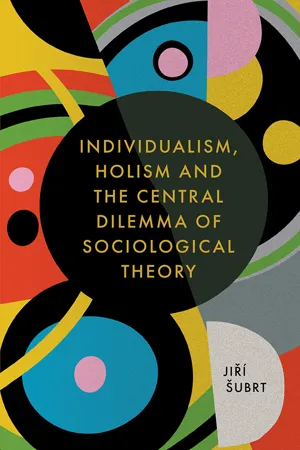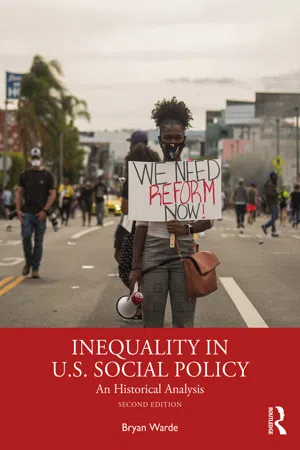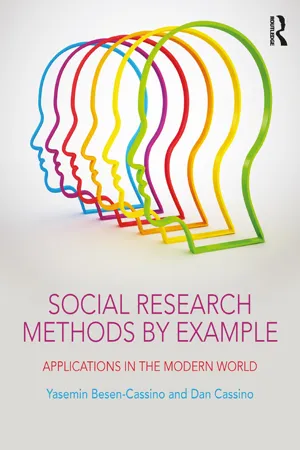Social Sciences
Sociological Theories
Sociological theories are frameworks for understanding and analyzing society and social behavior. They provide explanations for how and why individuals and groups interact, and how social structures and institutions shape human behavior. These theories help sociologists make sense of social phenomena and guide research and analysis in the field of sociology.
Written by Perlego with AI-assistance
Related key terms
6 Key excerpts on "Sociological Theories"
- Jiří Šubrt(Author)
- 2019(Publication Date)
- Emerald Publishing Limited(Publisher)
Chapter 1
What is Sociological Theory?
In this book, individualism and holism represent two distinct perspectives typically applied in the process of the formation of theory in the social sciences, specifically in the field of sociology; therefore, it is sensible to make a brief excursion to view the complex way theory is structured in contemporary sociology.The word theory is nowadays used in both scientific and everyday discourse, and in any given context, people usually have some idea what it means. Theory, especially but not only in lay terms, tends to be set in opposition to practice. As such it is associated with attempts at a rational interpretation of phenomena in a particular field (nature, society, human beings) based on very general, abstract forms of thought – such as concepts, opinions, hypotheses and laws. With the help of these, internally logical systems of understanding are developed that we can call theories in the broader sense of the word. Theory is not a direct, immediate description of really occurring phenomena, but rather an attempt to identify and interpret their basic features in an idealised and abstract way. Since every scientific study is by nature selective (never able to take into account every single aspect connected with a segment of reality), no theory can capture a studied phenomenon in its full complexity, but must in some way be reductive. Moreover, individual specific phenomena have characteristics of varying importance to different scientific fields of enquiry.Here a preliminary guideline is provided by Austrian sociologist Max Haller’s assertion that social-scientific and sociological theory is ‘a system of general statements with a systematic link to empirically observable social phenomena’ (Haller, 1999, p. 39). As understood by British sociologist Anthony Giddens, social theory1- eBook - ePub
Inequality in U.S. Social Policy
An Historical Analysis
- Bryan Warde(Author)
- 2021(Publication Date)
- Routledge(Publisher)
CHAPTER 4 Theoretical FrameworksDOI: 10.4324/9781003023708-4WHAT IS THEORY ?The social work dictionary defines theory as amongst other things explanations of the etiology/causes of social problems, such as inequality, poverty, discrimination, and so on. These explanations help social workers understand the development and causes of social problems as the basis for potential intervention that addresses those problems effectively (Baker, 2013).WHY THEORIES ARE IMPORTANT TO SOCIAL WORKThere are several reasons why theories are essential to social work. First, they provide a framework and order for practice. Even with the skills necessary for practice, social workers have to ground these in theoretical perspectives to help reflect on what they are doing and why they are doing it (Beder, 2000). Second, theories help social workers to identify, describe, explain, predict, control, and cope with various aspects of the worker–client relationship (Beer, 2000). Third, they inform specific practice interventions and strategies developed to address a vast array of human behavior. Fourth, they orientate/tell social workers about what is considered normative and abnormal development along a particular trajectory and supposed predictable life stages (Baker, 2013). Fifth, they explain how individuals, families, groups, organizations, communities, societies, and social movements develop and function (Baker, 2013). Sixth, and as indicated in the social work dictionary definition, they provide a conceptual framework for understanding the development of social problems and their impact on client populations, as well as possible solutions for addressing these issues (Baker, 2013).This chapter introduces the three theories that provide the book’s conceptual frameworks for examining social inequality and its pervasive and powerful influence on social policy. These theories are critical race theory (CRT), intersectionality theory (IT), and conflict theory (CT). Also introduced as a way of understanding the essence of social inequality is the capability approach. - eBook - ePub
- Pip Jones, Liz Bradbury, Shaun LeBoutillier(Authors)
- 2015(Publication Date)
- Polity(Publisher)
1 AN INTRODUCTION TO Sociological TheoriesIntroduction
Humans are social beings. Whether we like it or not, nearly everything we do in our lives takes place in the company of others. Few of our activities are truly solitary and scarce are the times when we are really alone. Thus the study of how we are able to interact with one another, and what happens when we do, would seem to be one of the most fundamental concerns of anyone interested in human life. Yet strangely enough, it was not until relatively recently – from about the beginning of the nineteenth century onwards – that a specialist interest in this intrinsically social aspect of human existence was treated with any seriousness. Before that time, and even since, other kinds of interests have dominated the analysis of human life. Two of the most resilient, non-social approaches to human behaviour have been ‘naturalistic’* and ‘individualistic’ explanations.Rather than seeing social behaviour as the product of interaction, these theories have concentrated on the presumed qualities inherent in individuals. On the one hand, naturalistic explanations suppose that all human behaviour – social interaction included – is a product of the inherited dispositions we possess as animals. We are, like animals, biologically programmed by nature. On the other hand, individualistic explanations baulk at such grand generalizations about the inevitability of behaviour. From this point of view we are all ‘individual’ and ‘different’. Explanations of human behaviour must therefore always rest ultimately on the particular and unique psychological qualities of individuals. Sociological Theories are in direct contrast to these ‘non-social’ approaches. Looking a little closer at them, and discovering what is wrong or incomplete about them, makes it easier to understand why Sociological Theories exist.Naturalistic theories
Naturalistic explanations of human activity are common enough. For example, in our society it is often argued that it is only natural for a man and a woman to fall in love, get married and have children. It is equally natural for this nuclear family to live as a unit on their own, with the husband going out to work to earn resources for his dependants, while his wife, at least for the early years of her children’s lives, devotes herself to looking after them – to being a mother. As they grow up and acquire more independence, it is still only ‘natural’ for the children to live at home with their parents, who are responsible for them, at least until their late teens. By then it is only natural for them to want to ‘leave the nest’, to start to ‘make their own way in the world’ and, in particular, to look for marriage partners. Thus they, too, can start families of their own. - eBook - ePub
Social Research Methods by Example
Applications in the Modern World
- Yasemin Besen-Cassino, Dan Cassino(Authors)
- 2017(Publication Date)
- Routledge(Publisher)
CHAPTER 4 Theory and Paradigms Learning Objectives • Be able to describe the role of theories in social sciences and research design • Be able to summarize the historical progression of positivism in social sciences • Be able to describe the dominant theories of social sciences and identify the types of research questions each theory asks • Be able to explain the role of theory and the importance of being guided by a theoretical perspective in research design THE IMPORTANCE OF THEORY Theory is the basis of all real social science research. While it may seem as if researchers are just crunching numbers or doing interviews, their research is actually guided by motivating theories or paradigms. These theories tell researchers which questions to ask and which methodologies to use and guide them in creating their hypotheses. Theories generally don’t make specific predictions about the outcome of a study, but rather work on the level of concepts. A relationship between two variables might be proven or disproven, but the theory itself cannot be proven or disproven—just that particular operationalization of that theory. Since theories can’t be proven wrong, they can’t be proven right either. This is what researchers call falsifiability. As such, there’s no such thing as a correct theory—theories are simply established ways of looking at the world. Any phenomenon in the world that social scientists are interested in can be studied through the lens of many theories, and the question is never which of these is the correct way of seeing that phenomenon, but rather, which theoretical perspective is the most useful in this circumstance - eBook - ePub
- Ken Browne(Author)
- 2019(Publication Date)
- Polity(Publisher)
Functionalism A sociological perspective which sees society as made up of parts – such as the family, education system and religion – which work together to maintain society as a whole. Society is seen as basically harmonious and stable, because of the agreement on basic values (value consensus) established through socialization.Consensus theorists, when studying society, emphasize these shared norms and shared values that exist between people, and see society made up of individuals and social institutions working together in harmony, without much conflict between individuals and groups.Conflict theory
Conflict theoryemphasizes that social order is maintained by coercion and power, with power in the hands of those with the greatest political, economic and social resources. Conflict theory has its origins in the work of Karl Marx (1818–83) and Max Weber (1864–1920), and is found in the work offeministwriters.Conflict theory A sociological approach that emphasizes social differences and conflicts, with inequalities in wealth, power and status all creating conflicts between individuals and groups.Feminist Someone who believes that women are disadvantaged in society, and should have rights, power and status equal to those of men.Rather than viewing society as essentially peaceful, harmonious and based on value consensus, as consensus theorists do, conflict theorists emphasize social differences and conflicts between individuals, groups and classes. They emphasize conflicts created by inequalities in wealth, power and status when describing and explaining society, as individuals and groups struggle against one another, pursuing different interests. Conflict theory is associated with Marxist, Weberian and feminist theories (see pages 53 –9 ). Conflicts exist, for example, between White British people and BAME groups, between men and women, between the rich and the poor, between employers and employees, between different religious groups (e.g. Christians and Muslims), and between different age groups (e.g. younger and older people). Figure 2.3 - eBook - ePub
Human Behavior in the Social Environment
Perspectives on Development and the Life Course
- Anissa Taun Rogers(Author)
- 2022(Publication Date)
- Routledge(Publisher)
As with symbolic interactionism, feminist theory teaches that people construct their own realities. In the case of women and members of minoritized groups, this reality is often based on history and past experiences of discrimination and oppression. Thus among the obvious strengths of feminist theory are its focus on equality and its questioning of the dominant structure. These strengths uphold the basic ethical tenets of the social work profession.Regardless of a person’s standpoint on the appropriate focus for feminist theory, this perspective clearly has drawn attention not only to predominant cultural values and structures but also to the ways in which we generate knowledge. Many social workers and scholars in other disciplines have relied on feminist theory to guide their research. One result of this process has been the creation of a body of literature that is qualitatively different from past work. Feminist theory has also validated the use of alternative research methods such as inductive reasoning, qualitative methods, the equal treatment of research participants (for example, they are often called “co-investigators” in this type of research), and the ways in which results are interpreted and applied.Cultural Perspectives
Although no single theory explains culture and its effects on human behavior, we need to consider cultural theories, particularly in the context of social work. Ideas, concepts, and applications of culture are inextricably linked with social aspects that affect clients. Of all the disciplines, social work is probably the most concerned with understanding the complexities of culture, especially when working with people.There is no universally accepted definition of culture; culture can mean different things to different people. In fact, definitions vary depending on the discipline and theory from which they originate. Even within the field of social work, the meaning of culture will differ depending on the context, problem, client, and social worker. From a sociological standpoint, culture is the result of all human endeavors. Culture can be viewed as including all things human such as norms, values, customs, symbols, thoughts, traditions, politics, religions, languages, philosophies, and material objects (Barker, 2003 ; Turner, 1998
Learn about this page
Index pages curate the most relevant extracts from our library of academic textbooks. They’ve been created using an in-house natural language model (NLM), each adding context and meaning to key research topics.





